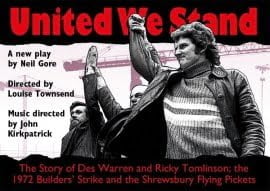United We Stand tells the story of the 1972 building workers’ strike and the conspiracy trial that followed, resulting in the imprisonment of three building workers with Des Warren receiving the harshest sentence of three years. However, the most famous of these prisoners is the now actor Ricky Tomlinson, who has collaborated with actor/playwright Neil Gore to tell this story.
United We Stand tells the story of the 1972 building workers’ strike and the conspiracy trial that followed, resulting in the imprisonment of three building workers with Des Warren receiving the harshest sentence of three years. However, the most famous of these prisoners is the now actor Ricky Tomlinson, who has collaborated with actor/playwright Neil Gore to tell this story.
Townsend Productions have in the past created ‘The Ragged Trousered Philanthropists’ and ‘We Will Be Free’, plays previously reviewed in Socialist Appeal. This play has reached a new level of production that I could easily run out of superlatives trying to describe.
The structure and authenticity of play rests on the close collaboration between Gore and Tomlinson, which is reflected in the dry wit of the Liverpool working class conveyed throughout the play. The playwright was able to use a vast resource of original material which includes the verbatim statements from the dock of Tomlinson and Warren.
As is usual with Townsend Productions, two actors have to take on the roles of all, from the building workers to the police to the Tory ministers and the judges; but the biggest role is that of the audience, who are enrolled into a union branch who vote for the strike action after a lukewarm speech from a national official is challenged by the impassioned appeal of local militants.
As is explained, the strike is not just about pay but also health and safety. At the time more construction workers died than in coal-mining and farming combined.
The other issue that made these workers angry was The Lump, a method by which employers would pay dubious self-employed workers cash in hand avoiding NI or income tax. Not only did this undercut pay, it also weakened union organisation. It shows that nothing has changed with today large multinationals avoiding paying tax sounding familiar.
Music a is a part of Townsend Production, with a few written for the show but a powerful rendition of the 1970s Union hymn “Part of the Union” setting the mood for the rest of the show. By use of a few scaffolding poles and sheets of plywood the stage can be reset from the building sites to the law courts and with the use of original footage projected onto one of the sheets we can see the strike and the protests outside the courts in full.
The two actors have to tell a complex history that the conspiracy was not that of the building workers, but of the police, the construction firms, the judiciary and the Tory Government. To help sell the idea of the ruling elite conspiring together Neil Gore has returned to the idea of using puppetry to comic effect.
The play is supported by an accompanying factual exhibition and information about a campaign to overturn all 24 prosecutions of the pickets.
One of the reasons why this play is so enjoyable is that it is in living memory of many in the audience who warmed to relive that period of the 1970s when workers were at the zenith of they power.
This play is in the best traditions of agitprop and should be widely seen. See tour dates and venuesee tour dates and venues. If no venue is near to you, get your trade union, trade union ouncil or Marxist Society to host a performance.






